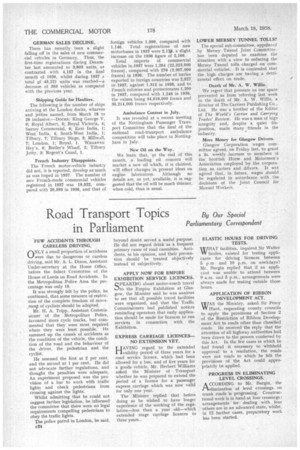Road Transport Topics By Our Special in Parliament Parliamentary Correspondent
Page 70

If you've noticed an error in this article please click here to report it so we can fix it.
FEW ACCIDENTS THROUGH CARELESS DRIVING.
ONLY a small proportion of accidents were due to dangerous or careless driving, said Mr. A. L. Dixon, Assistant Under-secretary at the Home Office, before the Select Committee of the House of Lords on Road Accidents. In the Metropolitan Police Area the percentage was only 15.
It was strongly felt by the police, he continued, that some measure of restriction of the complete freedom of movemenit of cyclists should be adopted.
Mr. H. A. Tripp, Assistant Commissioner of the Metropolitan Police, favoured more cycle tracks, but coinmented that they were most required where they were least possible. He summed up the causes of accidents as the condition of the vehicle, the condition of the road and the behaviour of the driver, the pedestrian and the cyclist.
He assessed the first at 2 per cent. and the second at 1 per cent. He did not advocate further regulations, and thought the penalties were adequate. An experiment proposed was the provision of a bar to work with traffic lights and check pedestrians from crossing against the lights:
Whilst admitting that he could not suggest further legislation, he irfformed. the committee that there were no legal requirements compelling pedestrians to obey the traffic lights.
The police patrol in London, he said, c24 beyond doubt served a useful purpose. He did not regard drink as a frequent primary cause of road casualties. Accidents, in his opinion, and their prevention should be treated objectively instead of subjectively.
APPLY NOW FOR EMPIRE EXHIBITION SERVICE LICENCES. QPEAKING about motor-coach travel to the Empire Exhibition at Glasgow, the Minister said he was anxious to see that all possible travel facilities were organized, and that the Traffic Commissioners had published notices reminding operators that early application should be made for licences to run services in connection with the Exhibition.
EXPRESS CARRIAGE LICENCES— NO EXTENSION YET.
HAVING regard to the extended validity period of three years for a road service licence, which had been allowed for a bus, and of five years for a goods vehicle, Mr. Herbert Williams asked the Minister of Transport whether he was prepared to extend the period of a licence for a passenger express carriage which was now valid for only one year.
The Minister replied that before doing so he wished to have longer experience of the working of the regulation—less than a year old—which extended stage carriage licences to three years.. ELASTIC HOURS FOR DRIVING TESTS.
WHAT facilities, inquired .Sir Walter iflf Smiles, existed for testing applicants for driving licences between 5 p.m. and 10 p.m. on weekdays': Mr. Burgin replied that if an applicant was unable to attend between 9 a.m. and 5 p.m., arrangements were always made for testing outside those hours.
APPLICATION OF RIBBON DEVELOPMENT ACT.
WAS the Ministry, asked Sir Percy W Hurd, requesting county councils to apply the provisions of Section 2 of the Restriction of Ribbon Development Act to roads other than classified roads. He received the reply that the attention of all highway authorities had been drawn to the powers conferred by this Act. In the few cases in which he had found it necessary to withhold approval to a resolution, the roads were not roads to which he felt the provisions of the Act could appropriately be applied.
PROGRESS IN ELIMINATING LEVEL CROSSINGS. CCORDING to Mr. Burgin, the tielimination of level crossings on trunk roads is progressing. Constructional work is in hand at four crossings; arrangements for dealing with four others are in an advanced state, whilst, in 12 further cases, preparatory work has been started.












































































































































